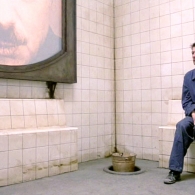
His small, individual, acts of defiance amount to little more than wishing to live his own life, and claim some small measure of comfort and happiness for himself. It is important to note that Winston himself poses no threat to Big Brother or the ruling government. Their fear lead them to abandon the love they held for each other, and they released as reintegrated members of society who have both learned to love Big Brother. In doing so, he has given O'Brien, and the Party, exactly what they want from him – and, his defiance is broken.Īs he is released, he is informed that, just as he betrayed Julia, she also betrayed him. Despite his earlier defiance, Winston ultimately breaks down, pleading that Julia be tortured in his place, and that he be spared. There, Winston is forced to confront his worst fear, a primal terror he has always held for rats, as a cage containing starving rats is fitted onto his face. Throughout it all, Winston is able to hold on to the belief that his love of Julia, and the fact that has not betrayed her, will sustain him – though this, too, is taken from him when Winston is finally taken to Room 101. There, he and Julia are separated, and Winston is interrogated and tortured, as O'Brien, revealed to be a loyal and high ranking member of the Party, sets about breaking down his resistance and stripping him of his defiant hatred of the Party. This is ultimately a trap, however, and Winston and Julia are inevitably captured by the Thought Police and taken to the Ministry of Love, a department dedicated to dealing with political dissidents, both real and imagined. Their hopes rest mainly with rumors of the Brotherhood, a resistance movement working against the controls imposed by the Party, and the possibility that they may be able to make contact with them through O'Brien, a member of the ruling Inner Party who they have come to believe may also harbor rebellious thoughts. While Julia is content with her own small acts of defiance, Winston begins to want more, leading Julia along with his growing hope that there could be more to life than what they have. Together, Winston and Julia begin to believe that there is some fleeting chance that there is more to life than what they have been able to claim, and that there is a chance, however small, that Big Brother may one day be overthrown.

His second crime, as the Party sees it, is in the relationship he pursues with Julia, a young mechanic who confesses her feelings for him, and in the brief moments the two are able to share together whenever they believe that they have slipped away from the Party's observation.

The necessity, this journal is something that he must keep hidden, as its very existence is direct evidence of 'thought-crime', which basically amounts to any thoughts or feelings which go against the Party, and is viewed as a serious threat to the stability imposed by Big Brother. The first of Winston's crimes is in the keeping of a journal in which he outlines the doubts he holds about the Party, and Big Brother. And this is a job he performs willingly, and even enjoys for the intellectual challenge it provides, despite whatever doubts he may hold, and his growing fascination with the truth of the past that he so carefully edits. Winston's duty, therefore, is as a direct tool of the governments control and oppression of its people. Working at the Ministry of Truth, a government department solely responsible for presenting history as the Party wishes it to be seen, Winston's job is to edit historical records and documents to better fit with The Party's current stance and beliefs, either by changing facts or by the editing out of undesirable 'unpersons' who the Party wishes removed from history. In the novel Nineteen Eighty-Four, Winston Smith works in the Outer Party, a minor government official kept separate from the inner workings of the ruling government, represented by the Inner Party. And perhaps, to the Party, more dangerous.

His defiance is of a different sort – more subtle and more difficult to define. He is not the leader of a resistance movement, trying to lead the fight against Big Brother. He is not a political dissident, or a revolutionary hero.

Very much the average 'everyman', Winston Smith finds himself in a position of rebellion against the Party, the ruling government of Oceania, almost by accident.


 0 kommentar(er)
0 kommentar(er)
